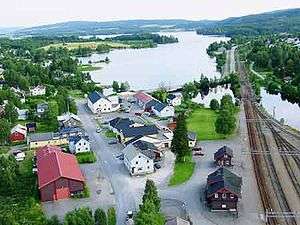Eina
Eina is a village in Vestre Toten municipality, Oppland, Norway. The population is 677.[1] The village is one of the destinations on the railroad track Gjøvikbanen, between Jaren and Raufoss. Eina is located a mere 12 km south of Raufoss, and has its center just north of Einavatnet (or Einafjorden). From Einavatnet comes the river Hunnselva which travels north to Mjøsa. Some 1,500 people inhabit the area surrounding the lake, not including Eina.

History
The area has been populated since before the early 11th century, but did not see significant growth until the Norwegian industrialization. This was due to the railroad line Gjøvikbanen being built, which brought passengers and freight to and through the village. In 1902, the local railroad station stood ready, and in 1908 Eina would become a municipality on its own when Vestre Toten split into three (Eina, Kolbu and Vestre Toten). At this time, Eina had 1,173 inhabitants, and was experiencing significant economic growth. In 1964, Eina merged with Vestre Toten, by then having grown to 1,591 inhabitants.[2]
Valdresbanen
Eina was also connected to Valdresbanen, another railroad line, until it closed.
Valdresbanen was built in 1906, and was originally a privately owned line, until the government assumed control in 1937. It covered the distance from Eina to Fagernes, which is located in Nord-Aurdal. The track was 109 km long, and was closed in 1988.
The name
The municipality (originally the parish) is named after the lake Einavatnet.
References
- ↑ Statistics Norway (2006). "Urban settlements. Population and area, by municipality. 1 January 2006".
- ↑ Dag Jukvam / Statistics Norway (1999). "Historisk oversikt over endringer i kommune- og fylkesinndelingen" (PDF).
- Vestre Toten municipality (Norwegian)
- Vestre Toten at Statistics Norway (Norwegian)
Coordinates: 60°38′N 10°36′E / 60.633°N 10.600°E